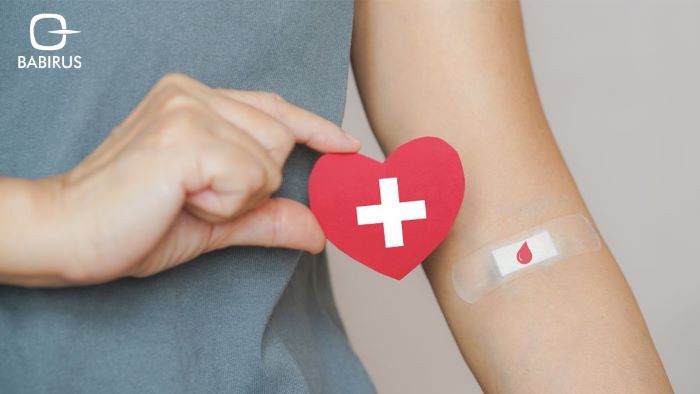The Importance of Blood Donation

The huge importance of blood donation comes from its role in saving lives, during various medical situations, from emergencies to surgeries, or chronic illnesses, thus, the role of blood donors is vital in helping hospitals and clinics provide the required and necessary medical care.
However, to consider any blood transfusion a successful process it must be done based on the standard and strict rules, by professionals, and within a safe and sterilized space.
Today, we are going to share with you details about the importance of blood donation, through updated information about the involved process, who can donate, the blood donor eligibility criteria, and how you can become a lifesaving blood donor.
The Lifeblood of Life:
The importance of blood donation is directly attached to its different components, which play a vital role in keeping us healthy and alive:
- Red Blood Cells.
- White Blood Cells.
- Plasma.
- Platelets.
Different Blood transfusion types are essential in treating a variety of medical conditions, like accidents, trauma, and surgeries, cancer treatments, chronic illnesses based on the patient’s requirements for blood components:
- Red Blood Cell Transfusions.
- Platelet Transfusions.
- Plasma Transfusions.
- White Blood Cell Transfusions.
Thus, we can understand the importance of blood donation due to its role in saving lives by providing essential blood components based on the patient’s needs, making blood donations a powerful gift that can make a big difference in lifesaving.
The 5 Steps of the Blood Donation Process:
The blood donation process is considered a noninvasive process, with straightforward steps that take in total one hour from the beginning to the finish:
1. Registration:
The first step, when arriving at a donation center, would be registering and providing some basic personal information, including your identification and health history.
2. Health Screening:
Then a healthcare professional will run a short health screening to guarantee that you meet the required blood donation criteria, including checking your blood pressure, pulse, temperature, and hemoglobin level, which is essential to ensure the safety of both the donor and the recipient.
3. The Donation Step:
Once the previous steps are done, the blood donor will be seated comfortably, and a sterile needle will be used to draw blood from his/her arm, the process takes around 10-15 minutes to collect about one pint of blood.
4. Post-Donation:
After donating, you will be given refreshments to help replenish fluids and nutrients, it is recommended to rest for a few minutes before resuming your day.
5. Blood Screening:
The importance of blood donation comes from its ability to save lives, thus, it must be tested to ensure safety, this includes common tests like screening for infectious diseases such as HIV, Hepatitis B (HBV), and Hepatitis C (HCV).
Moreover, to ensure the highest safety standards, advanced systems like the Abbott Alinity S are used to screen for these infections, making sure the blood is thoroughly tested and safe for transfusion to protect both donors and recipients.
Who Can Donate Blood?
Usually, the average human body contains between 4-6 liters of blood, therefore, a healthy person has more than enough to safely donate, yet, some basic criteria need to be met to ensure the safety of the blood donation process:
- The donor must be between the ages of 18 and 60.
- The person’s weight must be at least 50 kg.
- Meet sufficient levels of hemoglobin and platelets.
- In good overall health, which means no recent illnesses or infections, and they should feel well on the day of donation.
These standards ensure that the donation process is safe and that the blood collected is healthy and beneficial for those in need.
Who Cannot Donate Blood?
Basically, all people can donate blood, however, some medical conditions can make the blood donation process unsafe for the donor and receiver:
- People who have been diagnosed with blood cancer, diabetes that requires insulin, or coronary artery disease.
- Individuals with infectious diseases such as AIDS, Hepatitis B, or Hepatitis C.
- People with a fever at the time of donation.
The Impact of Blood Donation:
We can divide the impact of blood donation into two sections, as the process itself touches the lives of donors and recipients.
- For the recipient, blood donation can be lifesaving, as just one pint of blood can be separated into red cells, plasma, and platelets, and may help up to three different patients, who are undergoing surgery, a trauma victim, or a person with a blood disorder like anemia.
The importance of blood donation comes from its amazing and positive impacts on lives when there is a blood shortage, thus, regular donations are vital to guarantee there is always enough blood available for those who may need it.
- For the donor, the blood donation process comes with many medical benefits, as it helps maintain healthy iron levels, reduces the risk of heart attacks and strokes, and even lowers the chances of certain cancers.
Moreover, donating blood can support better liver health and help regulate blood pressure.
Therefore, the act of blood donation is considered a powerful and positive process for both the giver and the receiver.
Dispelling Common Myths About Blood Donation:
As you just read, blood donation is a lifesaving process for patients in need with positive impacts for the donor as well, however, many people are afraid to donate due to myths and misconceptions around blood donation:
Myth 1 – Donating blood takes too much time:
The whole process of blood donation, from registration to relaxing with a post-donation snack, takes only one hour, meanwhile, the actual blood donation itself only takes around 10 minutes, thus, it is considered a quick and easy lifesaving process.
Myth 2 – Donating blood is painful:
Despite what some people think, yet, usually donors describe the blood donation sensation as just a quick pinch when the needle is inserted, followed by little or no discomfort, moreover, experienced donors often say that they hardly notice the needle anymore.
Myth 3 – My blood type is not rare, so it is not needed:
Every blood type is essential and required in the donation process, however, some blood types are more popular than others, as O-negative is known as the universal donor and is crucial in emergencies.
On the other hand, O-positive and all other blood types are equally important and in demand, so, no matter what is your blood type, your donation is valuable and needed.
Myth 4 – I am on medication, so I cannot donate blood:
Although it is important to tell the healthcare specialist about your health condition and any medication you are taking, however, in most cases, being on medication does not stop you from donating blood.
Yet, the key factors are why you are taking the medication, is your condition stable, are you in good health to be an eligible donor or not.
On the other hand, there are a few medications that might need a waiting time before being able to safely donate blood.
Myth 5 – I have high blood pressure, so it is too risky for me to donate blood:
When you arrive to donate, your blood pressure will be checked as part of the health assessment, and to be able to donate your blood pressure should be within a safe range—180 or below for the systolic (top number) and 100 or below for the diastolic (bottom number).
Moreover, taking medication to manage your blood pressure does not disqualify you from donating.
How to Become a Blood Donor?
It is more than simple to become a blood donor, as we can divide the whole process into three steps:
- First, you should meet the blood donor eligibility requirements, including being in good health, being at least 17 years old, and weighing at least 50 kg.
- Second, find a local blood donation center or blood drive, which you can find through websites or community announcements.
- Third, before donating, it is essential to stay hydrated, eat a healthy meal, and avoid fatty foods, to keep your blood test results good, and after donation just rest, and drink plenty of fluids.
Eventually,
After all that you read, you would understand that the importance of blood donation is bigger than just donating, as it is considered a lifesaving action, as every blood donation has the potential to save multiple lives.
Thus, be an active member of the blood donation community, and be a lifesaving person to avoid blood shortage in emergencies and other critical situations.

